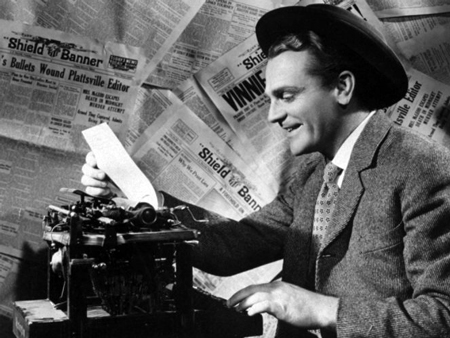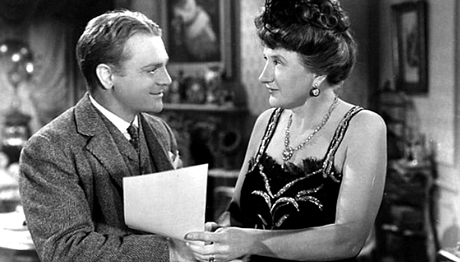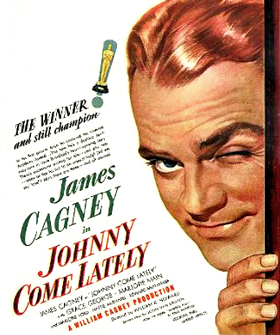|
|
Reviewed by Glenn Erickson
Most movie fans don't realize that even some of the biggest stars of the 1930s were chained to seven-year studio contracts that paid them relatively little considering the huge fortunes being raked in by the studio moguls that employed them. Big stars found the studios eager to run every detail of their lives, rushing them from production to production without a break and enlisting them in promotional activities when if they happened to have free time. Some of the luckiest film personalities, and not necessarily big stars, quietly saved their money and bought real estate, amassing huge fortunes. Others that took acting seriously wondered if they'd be used up and discarded after being wasted in roles that didn't make proper use of their talent. Studios worked to formulas, of course, and sometimes showed little imagination with their casting.
Serious talents like Bette Davis, Olivia de Havilland and James Cagney raised hell with Warners, drawing various forms of punishments but also earning better treatment -- and scripts -- because of it. Many stars surely thought to themselves, what if I got off the studio's payroll and produced my own movies? Think what I could do if I wasn't under the restraint of penny-pinching producers, and didn't have to put up with the bullying, the pressure, and cookie-cutter formulas?
James Cagney found himself in this situation twice. A contract dispute made him independent for a year starting in 1936. The walkout earned him a better deal when he returned. Then, after the smash success of Yankee Doodle Dandy in 1942, he and his brother William Cagney went independent, releasing pictures through United Artists. The first title out the door was Johnny Come Lately, the exact kind of movie the star wanted to make. Instead of a gangster or a smart-talking sharpie, Cagney plays a decent guy who comes to the aid of a widow and helps clean up a corrupt town.

Adapted from a novel, John Van Druten's story holds no surprises. The year is 1906. Newspaperman Tom Richards (Cagney) is picked up for vagrancy in Plattsville, a small town run by the despotic banker Dougherty (Edward McNamara), who wishes to put a newspaper called Shield and Banner out of business because it opposes his shady deals and corrupt influence with City Hall and the police. Sitting in on morning court, the paper's publisher Vinnie McLeod (Miss Grace George) hears that Tom has journalism experience and hires him on the spot. Tom finds out that the Shield and Banner is all but in receivership and that McLeod, a widow, knows just enough of the business to antagonize Dougherty with her editorials. In no time at all Tom sets the paper on a new course, inundates Dougherty with direct charges of corruption and scours the town for support against him. Everybody hates Dougherty but as their businesses already pay him protection money nobody dares speak up. Meanwhile, Tom grows soft on Ms. McLeod's beautiful daughter Jane (Marjorie Lord). Jane has broken off her engagement to Dougherty's rather thickheaded son Pete (Bill Henry), but unknown to Tom, is still in love with the boy.
Ten years later, this story would be the basis of a grim film noir, with real corruption on view, vicious injustice and a finale littered with corpses -- think The Phenix City Story. But this was 1943. Predictably uplifting from one end to the other, Johnny Come Lately has Cagney at his most charming and a cast that was obviously handpicked to the star's taste. Grace George he doubtlessly admired from the New York stage; this was her second (and only movie) since 1915. Johnny Come Lately was a good opportunity for the charming Marjorie Lord, who we discover was married to actor John Archer (later of Cagney's White Heat) and is the mother of none other but... Anne Archer. Favorite Margaret Hamilton is present, along with George Cleveland as the paper's incompetent long-term reporter. But Cagney's best co-star is Marjorie Main, who gives a fun performance as Gashouse Mary, the owner of a wild (but decent) roadhouse.

Scattered throughout the story are choice bits for at least twenty actors, starting with future western icon Arthur Hunnicutt. Johnny Come Lately seems to have been a haven for everybody Cagney wished he could put in a movie. Curiously, the only actor not to warm up to the camera was Cagney's obvious favorite, Grace George. She's perfectly fine, but we feel much more affectionately attached to Marjorie Main's effusive Gashouse Mary.
Screenwriter John Van Druten has a number of impressive credits on his filmography, but the script for Johnny Come Lately does nobody any favors. Cagney's Tom Richards is a standard "natural hero" with no vices, no skeletons in his closet and no bad habits. At one point in the movie Tom hitches a ride on a freight car, and we momentarily wonder if he's skipping town due to Dougherty's threats of violence. No, Richards is just that kind of natural man who draws his strength from the common things -- he has an inspiring talk with a hobo (Victor Kilian), as if he's recharging his batteries. It's no wonder that Cagney's real interest at this time was establishing his new farm in Martha's Vineyard, and that his love of folksy characterizations would soon steer him to adapt to the screen William Saroyan's The Time of Your Life. Despite the few surprises on hand, this story has more than enough charming characters to entertain us. Cagney even has an amusing relationship with his employer's maid and cook, played by Hattie McDaniel.

What really hurts Johnny Come Lately is probably a natural outgrowth of James Cagney's affable disposition. The production was probably a total pleasure, with Cagney being generous with his fellow actors -- unlike a typical studio set, with front office suits putting pressure on everyone about wasted time. William K. Howard's easygoing direction lets everyone shine. The problem is pace. The movie is slow. Cagney surely saw good performances being trimmed away in the average breakneck Warners' film, and possibly wanted to let gestures and moments play. It shows in every scene, and will call out to any editor: Make Some Trims Here And There. Just about the only scenes that don't seem slow are the ones with Marjorie Main. Everything else needs to be goosed a little bit, if only to prevent the audience from guessing the entire plot when the movie is only ten minutes in.
Johnny Come Lately is a perfectly fine picture if one is in a leisurely mood, or really likes to see James Cagney indulge himself. One good scene simply shows Tom Richards' amusement at the sight of an old-fashioned set of straight razors, one for every day of the week. We don't mind that James Cagney is not playing a tough guy. He doesn't even insist that his character wins the girl. Cagney of course never wears out his welcome, but the movie might have done a lot better had one of Warners' cutters sneaked over and made some suggestions.
Johnny Come Lately did fairly well, as opposed to Cagney's other independent productions Blood on the Sun and The Time of Your Life. By 1948 the star was forced back into a deal at Warners. Ironically, he agreed to re-invent himself as a tough guy with a character 100 times more brutal than any he'd yet play: Cody Jarrott in White Heat.

Olive Films' Blu-ray of Johnny Come Lately comes from original elements and is in fine shape, both picture and sound. Although no cleanup has been performed, the picture is mostly clear, with only a few tiny scratches and other minor imperfections. Theodor Sparkuhl's B&W cinematography captures the period well; when Tom enters Vinnie McLeod's home, it does indeed look like something decorated in a style from earlier in the 19th century. Leigh Harline's music is appropriately sweet; we tend to forget that the relatively un-celebrated composer wrote all of the incomparable music for Disney's Pinocchio.
On a scale of Excellent, Good, Fair, and Poor,
Johnny Come Lately Blu-ray rates:
Movie: Good, maybeGood -
Video: Excellent
Sound: Excellent
Audio: English
Supplements: none
Deaf and Hearing Impaired Friendly?
No; Subtitles: None
Packaging: Keep case
Reviewed: May 21, 2014

Text © Copyright 2014 Glenn Erickson
See more exclusive reviews on the Savant Main Page.
Reviews on the Savant main site have additional credits information and are often updated and annotated with footnotes, reader input and graphics.
Return to Top of Page
|

